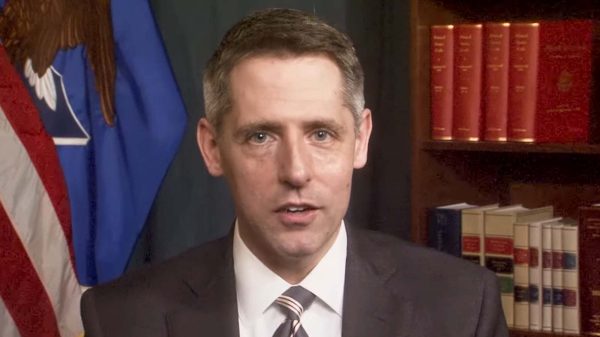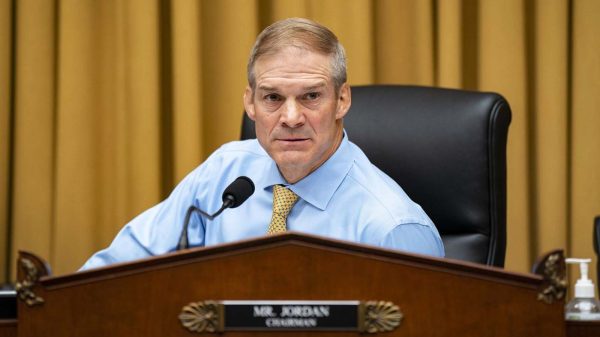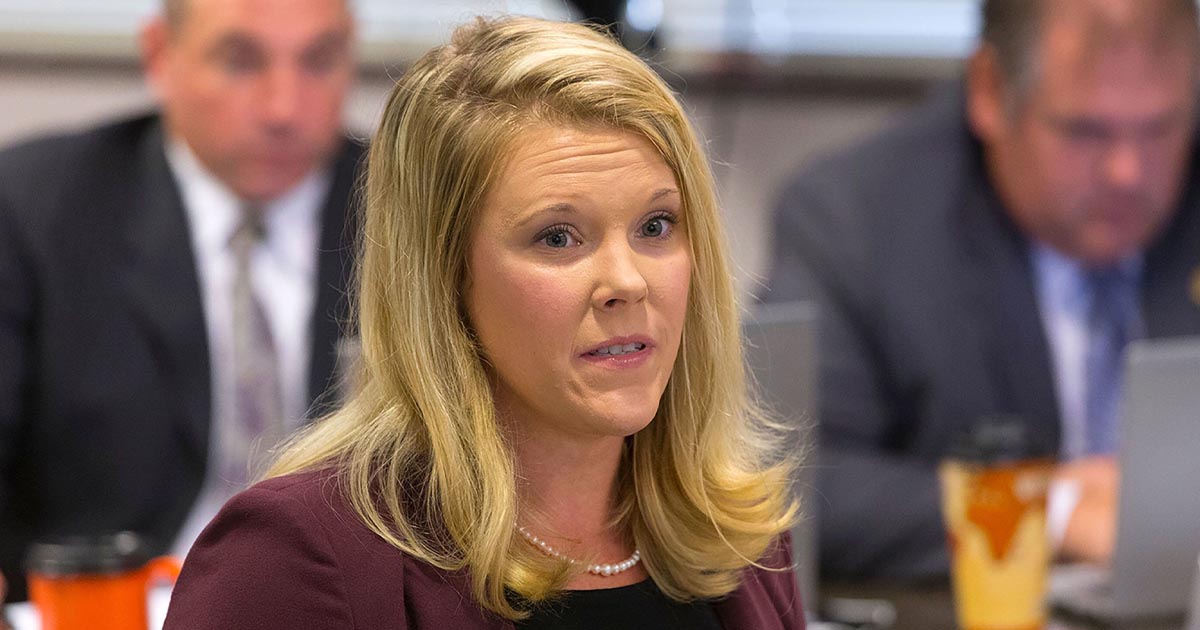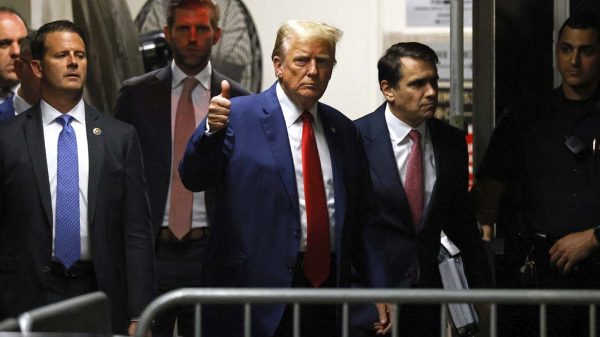Meagan Wolfe, the controversial administrator of the Wisconsin Election Commission (WEC), is facing actions calling for her impeachment.
On Sept. 21, five Republican state assembly members presented both houses of the Legislature with a 23-page resolution containing 15 articles accusing Ms. Wolfe of maladministration in office.
The lawmakers further alleged that Ms. Wolfe either created or implemented a string of policies and practices that run contrary to state law.
Since the 2020 presidential election, several actions by the WEC under Ms. Wolfe’s guidance have been declared illegal by Wisconsin courts.
Cosponsors of the resolution are Reps. Janel Brandtjen, Scott Allen, Elijah Behnke, Ty Bodden, and Chuck Wichgers—all Republicans.
Some Republicans believe Ms. Wolfe’s policies and directives favored the Democrats and may have cost former President Donald Trump the Badger State’s 10 electoral votes in the hotly contested and chaotic 2020 election.
On Jan. 6, 2021, Congress acknowledged the WEC’s tally that President Trump had lost Wisconsin to Joe Biden by less than 21,000 votes.
Just Following Orders
Within hours of the filing of the resolution, Ms. Wolfe issued a statement responding to the charges, saying they “misrepresent my actions and how this agency works.”
Ms. Wolfe has consistently maintained that she is not a policymaker and has done nothing but follow WEC’s orders. However, critics says this attempt to pass the buck runs contrary to the state law creating the Wisconsin Election Commission, which reads in pertinent part, “The election commission shall be under the direction and supervision of an administrator who shall be appointed by a majority of the members of the commission.”
Ms. Wolfe stated, “Every major decision relating to the 2020 election was made by the agency’s six bipartisan commissioners in public meetings.”
In her response, she disputed the veracity of the claims made in the resolution, pointing out that numerous investigations have shown that “Wisconsin’s elections are run with integrity.”
“It’s irresponsible for this group of politicians to willfully distort the truth,” she said.
Calling the attempt at impeachment “unlikely to succeed,” Ms. Wolfe urged election officials to start preparing for the next presidential election—an election, she said earlier, that she intends to manage despite a lack of Republican support for her to continue on in what they say should be a non-partisan position.
Claims of Maladministration
Some of the allegations against Ms. Wolfe contained in the articles include her allowing election workers and even employees of non-profit organizations to play an active role in correcting omissions and errors on an absentee voter’s certificate or ballot envelope.
Wisconsin law mandates that voters do their own corrections.
Another article alleges that Ms. Wolfe failed to create an effective verification system capable of preventing bad actors from filing numerous absentee ballot applications and receiving ballots in other people’s names at different addresses.
Real-life examples of such occurrences were included in the resolution.
“When a lawsuit sought declaratory and injunctive relief to compel Administrator Wolfe to address this dereliction, she engaged the services of a private law firm, the Mark Elias Group, in an attempt to avoid remedying the situation,” the resolution said.
Mark Elias is a top election strategist for the national Democrat Party.
Follow the Money
The funding for the operation came from grant money awarded to localities by the Zuckerberg-supported left-leaning NGO Chicago-based Center for Tech and Civic Life (CTCL).
The stated aim of the grants was to help communities conduct safe elections in the midst of the COVID-19 pandemic.
Wisconsin’s five largest cities; Milwaukee, Madison, Racine, Kenosha, and Green Bay, received grant payments totaling $8.8 million. That represented 86 percent of the total CTCL grant funds awarded in Wisconsin. The remaining 14 percent was divided between smaller jurisdictions throughout the state.
As post-election expenditure reports submitted to Ms. Wolfe by the five cities showed, very few grant dollars were spent on plexiglass shields and personal protection equipment (PPE) for clerks and poll workers.
For example, Green Bay reported spending only one percent of its grant award on PPE.
The five cities were criticized in the articles for their “lack of transparency in the financial reporting.”
The resolution raised the question of whether the vast majority of the funds were used “to promote voter turnout among specific demographic groups favored by partisan actors.”
According to Article 11, Ms. Wolfe told a legislative hearing that she was not even aware of the CTCL grant funding until she learned of it from a city’s financial report on Aug. 30, 2020—a contention the resolution said “strains credibility.”
To receive a grant, municipal election officials agreed by contract to install absentee ballot drop boxes, “cooperate with CTCL directives, and follow the instructions of CTCL’s designated personnel in administering the elections,” alleges the resolution.
Mishandling of Actual Ballots
According to the resolution, Ms. Wolfe’s mishandling of absentee ballot applications “paralleled her maladministration of absentee ballot returns.”
After the 2020 presidential election, the Wisconsin Supreme Court ruled that the state election law does not allow agents or anyone other than the elector to submit an elector’s absentee ballot directly to a clerk’s office and that a person-to-person exchange between the elector and the clerk, or clerk’s authorized representative was required.
“Therefore, Administrator Wolfe’s memos advising otherwise conflicted with the law and were rightly void,” the resolution said.
No Verification of Identity
The articles also allege that Ms. Wolfe allowed the potential circumventing of Wisconsin’s proof of identification laws through the WisVote online absentee ballot request form—a method WEC lacked the legal authority to establish.
The resolution asserts, “The underlying issue lies in mailing absentee ballots without proof of identification.”
They also point out that WEC has no legal authority to receive absentee ballot applications. By law, these applications are required to be submitted to the municipal clerk.
An intermediary such as WEC is not one of the six statutorily specified methods to obtain an absentee ballot, according to the resolution.
Inflated Voter Rolls
The failure by Ms. Wolfe to remove ineligible names from the state voter roll was outlined in Article 14.
According to WEC’s own figures, the state of Wisconsin has 4.5 million voting-age people but there are 7.1 million names on the state voter roll.
Under Ms. Wolfe’s leadership, the article alleges that “names are never removed from the voter roll, even in cases of individuals who have passed away.
“Rather than designating these deceased individuals as ‘ineligible’ voters, as the statute would dictate, Administrator Wolfe categorizes them as ‘inactive’ voters, thereby allowing their names to persist on the voter roll.
“At best, this practice of retaining deceased individuals on the voter roll needlessly complicates the list, making it more challenging for auditors.
“At worst, it provides a reservoir of names that can be ‘activated’ two weeks before an election and ‘deactivated’ two weeks after by anyone with access to the WisVote system.
“This process operates in a manner that conceals the identities of both the ‘activator’ and the ‘deactivator.’
“Administrator Wolfe’s oversight of this problematic system is unacceptable,” according to the resolution.
















Wolfe was not elected. She can be fired, not impeached. WI legislature needs to get rid of Vos if anything is to change.
WILL I GET “AWAITING MODERATION I.E., “CENSORED” FROM THE THIS TRUTH THAT NEEDS TO BE POSTED, MORE THAN LIKELY BECAUSE “TRUTH” HURTS ESPECIALLY KNOWING THIS IS “TRUTHPRESS”
To think these are “POTENTIAL” dems~ 7 million ++ as of July 2023 & an influx of 300k in August 2023 then add in the 470k Venezuelans that got a “WORK PERMITS” & this isn’t including the “GOTTA WAYS” nor the roughly 30 + million that were here prior to these latest figures.
Add in all DAPA children that became the “ILLEGAL” DACA under Obama because he ram rod this through w/out the proper policies!!! (Roughly 580,000 individuals are DACA recipients, according to a new report from pro-immigration group FWD.us.) according to June 2023 stats.
THIS IS A “MUST” FOR AMERICA~
One of the most secure ID documents in Latin America, the new voting ID card used in Mexico includes multiple security features and state-of-the-art verification methods that have so far foiled every counterfeiting attempt. Since 2013, the card has been produced by G+D and Veridos and has been available for Mexico’s citizens – including the 12 million who live abroad. At last, all of the country’s citizens can finally benefit from the technology without the risk of identity fraud.
Not just to combat electoral fraud, but also to provide a reliable mechanism to be identified, a newly designed voting ID card was made available to all Mexican citizens – including the 12 million who live abroad, to whom it was sent in a security envelope. According to the National Electoral Institute (INE), the autonomous public organization responsible for elections in Mexico, the cost and risk to make the trip back to Mexico to register for a voter ID card had deterred many people in previous elections.
The new voting ID card, produced by global identity solutions provider Veridos, meant that all of Mexico’s 132 million citizens could finally benefit from the latest technology, and could have a reliable identity document. As Jacob Prado, Mexico’s consul general in El Paso, Texas, said in 2016, “The effort had one thing in mind: to perfect – and keep perfecting – our democracy.”1
Counterfeit-proof – and cheaper than a chip
How does one produce an ID card that cannot be counterfeited? It seems that Veridos has the answer. As Rolando Colchado, Managing Director of Veridos Mexico, says, “Thanks to multiple security features and state-of-the-art verification methods, our identity solution is highly reliable and trustworthy. Since we started with voter ID production in 2013, we’ve managed to improve and enhance the product to become one of the most secure documents in Latin America.” Indeed, according to Colchado, this technologically innovative paper-based document has made it possible to foil every counterfeiting effort to date.
Creating value for the environment and for society
Zuckfuck should be held accountable for election interference.